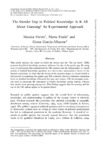The Gender Gap in Political Knowledge: Is It All About Guessing? An Experimental Approach

View/
Use this link to cite
http://hdl.handle.net/2183/40259
Except where otherwise noted, this item's license is described as Atribución-NoComercial-SinDerivadas 4.0 Internacional
Collections
- Investigación (FSOC) [404]
Metadata
Show full item recordTitle
The Gender Gap in Political Knowledge: Is It All About Guessing? An Experimental ApproachDate
2017Citation
Ferrín, M., Fraile, M., García-Albacete, G. (2017). The Gender Gap in Political Knowledge: Is It All About Guessing? An Experimental Approach. International Journal of Public Opinion Research (29) 1, Spring p. 111–132. https://doi.org/10.1093/ijpor/edv042
Abstract
[Abstract] This article analyzes the extent to which the format and the “Do not know” (DK) protocol of political knowledge questions influence the size of the gender gap. By using a set of experiments that manipulated the DK protocol and the format (open vs. closed ended) of political knowledge questions in a face-to-face representative survey of the Spanish population, we show that the format of the questions (open vs. closed ended) is not relevant in explaining the gender gap. DK protocols, however, influence outspoken levels of political knowledge differently for men and women. DK-discouraging protocols tend to encourage the emergence of hidden knowledge among women, whereas they mostly boost guessing among men. This finding suggests that the meaning and the use of the DK option appear to be gender biased.
Keywords
Political knowledge
Gender gap
Question format
Don’t know protocol
Measurement problems
Guessing
Gender gap
Question format
Don’t know protocol
Measurement problems
Guessing
Editor version
Rights
Atribución-NoComercial-SinDerivadas 4.0 Internacional
ISSN
1471-6909






